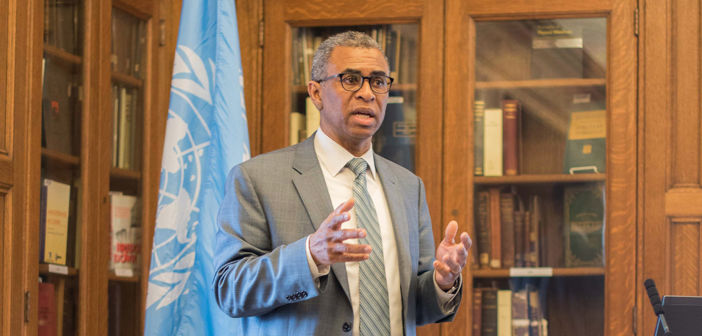Elliott Harris, the assistant secretary general of the United Nations Environmental Programme, addressed the Lehigh community Thursday. Harris sat down with The Brown and White for a brief question and answer session. A recap of the lecture can be found here.
Q: Your background is rooted in economics. What did your path to the United Nations look like, and your introduction to sustainability?
Elliott Harris: I know exactly when it happened. As you know I’m a trained economist, and I spent a lot of time with (the International Monetary Fund). I happened to have been traveling into Geneva, and I met a colleague from (United Nations Environment Programme) who said, ‘Well look, if you’re free on Wednesday come by, we’re going to talk about the macroeconomic chapter of our Green Report.’ I went over there, and I had one of those ‘aha’ epiphany moments, because what they were talking about was economic planning, economic activity that was environmentally sustainable. It was a light bulb — the proverbial light bulb that went off in my head. And it’s still the most interesting thing I’ve ever done.
Q: What does a truly sustainable world look like? What’s the largest roadblock to successfully attaining that?
EH: I think the ideal world would be one where people have options, have choices, to be more sustainable. And we do so in awareness of the little bit of contribution that we can make through our every day choices. If we’re aware of the choices we’re making and why we’re doing them, then I think we’ll make very rapid progress and will sustain ourselves.
Q: The U.N. was founded 70 years ago. Is it just as important and relevant today as it was then, or even more so today?
EH: The U.N. has changed. But it’s the third kind of U.N. that nobody really notices, and that’s the U.N. of the technical agencies, that is part of the very fabric of modern times. It’s the U.N. of the International Telecommunications Union, without which cell phones don’t work. It’s the U.N. of the International Civil Aviation Authority, without which planes bump into each other and kill us. I think that aspect of the U.N. has become even more important, although it is subterranean and not very visible.
Q: What has been the proudest moment you’ve had so far in your position?
EH: I think one of the proudest moments would be the work we’ve been doing on the financial sector. What we found out is that there is a quiet revolution going on in the financial markets, but what we achieved was to put together a narrative that explains what was going on. We see now that that whole movement has actually picked up speed and is moving ahead, and we know this green financial approach is absolutely essential to truly attaining sustainability. So without this work on green finance or sustainable finance, we would have less confidence that we will be able to mobilize the private sectors.
Q: There is still a percentage of the American population that rejects the idea of climate change — what is your approach to climate change deniers?
EH: There will always be people who don’t want to confront the objective facts and science of things. I think the key point is to make sure as many people are aware of science, of objective facts, and that they understand how it manifests itself and what they can do about it. If somebody wants to believe, they would either believe in climate change or not believe in climate change. Maybe it’s less important to try to convince those who want to believe there is no climate change, and let them continue that way.
Q: How do you set realistic goals for yourself in your position? Have they changed in any way since you began?
EH: I realized that I am not by myself going to make policy change matter. I see my role as making information available and providing arguments that will enable those who see the need for change to see that change happen. What the U.N. is good at is bringing together people from all different walks of life, and that sustainability agenda requires this — it requires different peoples together — so I think this is one of the biggest challenges: identifying the arguments that people can use effectively, and bringing the right people together so they can jointly make it out.
Q: Have you ever had difficulty convincing nations to adopt sustainable practices when their economies are based largely on unsustainable ones?
EH: That is still a problem, not just when I started but to this day. And one of the advantages we have through the Sustainable Development Agenda is that all countries participated in bringing it together in the first place. So there’s a recognition of a need for sustainability. But there are some countries — take, for example, some nations are heavily dependent on fossil fuels. And for those countries of course, the proposition of moving away from this path is a much more existential question.
But of course a lot depends on the willingness of that nation to confront the choices that they made, and the earlier these choices are made, the better the adjustment and the sooner it takes place.
This interview has been edited for length and clarity.






Comment policy
Comments posted to The Brown and White website are reviewed by a moderator before being approved. Incendiary speech or harassing language, including comments targeted at individuals, may be deemed unacceptable and not published. Spam and other soliciting will also be declined.
The Brown and White also reserves the right to not publish entirely anonymous comments.
1 Comment
Environmental issues are closely tied with women’s human rights. Trump has defunded the UN Population Fund, an horrific act. The American people can take a stand at http://www.34millionfriends.org of UNFPA.